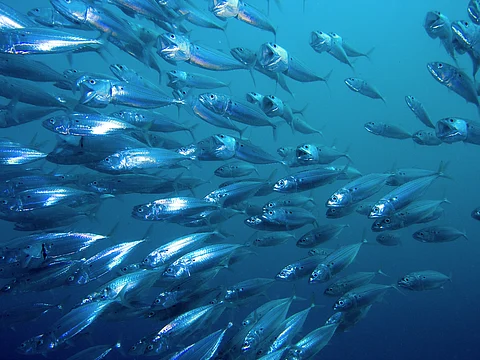

Herring, blue whiting and mackerel in the North-East Atlantic have lost or had their MSC certifications suspended following disagreements on quotas between fishing nations.
Photo: Adobe Stock.
Brands and retailers can help to drive better management of small pelagic fish stocks, according to the Marine Stewardship Council (MSC), which warns that disagreements over quotas coupled with growing demand for these species - both for human consumption and aquafeed - threatens their long-term sustainability.
Releasing its annual MSC Small Pelagics Yearbook 2025, the MSC highlights that recent disagreements among fishing nations over quotas in the North-East Atlantic have led to the loss or suspension of MSC certifications for herring, blue whiting, and mackerel in the region.
Over the past 25 years, these three pivotal stocks have only had international agreements in place for a total four years, resulting in catches that exceeded scientific advice by 31% over the last seven years.
Last year, the North Atlantic Pelagic Advocacy Group (NAPA) warned that herring stocks are on the brink of collapse in the North Atlantic, risking a repeat of the disastrous 1960s collapse if overfishing continues.
In reaction to the risk of supply disruptions, the MSC says that some of its commercial partners have shifted to other pelagic fisheries, such as North Sea herring, summer-spawning Icelandic herring, Southern Gulf of California thread herring, and Chilean jack mackerel. These alternatives remain MSC certified and are essential for meeting market needs while helping relieve pressure on compromised stocks, the organisation says.
More than three million metric tonnes of small pelagics were MSC certified in 2024, representing 12% of the global small pelagic catch, with canned goods accounting for 58% of MSC certified small pelagic catch.
Beyond their commercial value, small pelagics - such as sardines, herring, and mackerel - play a pivotal role in marine ecosystems, acting as the primary food source for larger predators. Their high protein and Omega-3 content also make them increasingly sought-after for human diets, fish oil supplements, and aquafeed.
The MSC predicts that demand for small pelagics will continue to grow as aquaculture expands and the market for sustainably sourced fish oils for human consumption gains traction. As evidence of this trend, fish oil supplements carrying the MSC ecolabel have grown from just four products in 2008 to 475 in the 2023/24 financial year, the MSC said.
“Against this backdrop of increasing demand, it is vital to protect small pelagic fisheries for the future. This newly published yearbook demonstrates the role of certification in driving sustainable outcomes for this species group, whilst highlighting the risks to these highly dynamic fisheries when international agreements are not in place to protect from overfishing and mismanagement," said Nicolas Guichoux, MSC’s Chief Program Officer, in a press release.
“Retailers and brands have a huge role to play in driving momentum towards greater availability of certified small pelagic fish in the supply chain. In addition to species that are in the pipeline towards certification, the necessary changes to quota setting for stalwart species such as Atlantic mackerel, blue whiting, and Atlanto-Scandian herring need to be made to allow their return to MSC’s program," said Guichoux.
“These species are vital in servicing important global markets that are reliant on these fisheries as a critical source of protein, ensuring certified availability for both industry and consumers. In the longer term, this could affect prices and volumes of product for the market," Guichoux added.
The Small Pelagics Yearbook 2025 also examines the impact of climate change on these fisheries, noting shifts in stock distribution that can complicate management efforts. Alongside cautionary tales, it also points to success stories from certified fisheries and demonstrates how certification supports positive outcomes for communities, the marine environment, and the broader global market.
